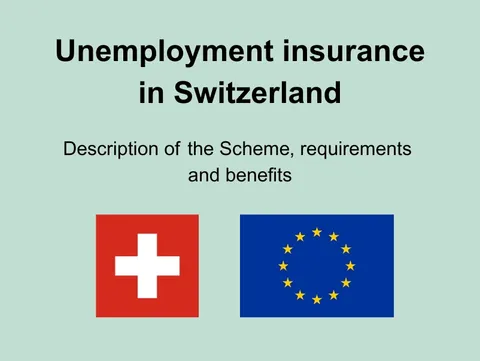EU
Switzerland
Unemployment
Insurance
Unemployment Insurance in EU->Switzerland
Unemployment insurance in Switzerland
Type of scheme
How to join? Compulsory Unemployment Insurance. You will automatically be enrolled in unemployment insurance when you start working in Switzerland, and the compulsory insurance ends with the end of the employment relationship. The income is insured by the unemployment insurance scheme for those who earn an average monthly income of at least CHF 500.
Contribution: Contributions are paid by the employer and the employee equally.
Who is covered? All employees.
Benefit amount: Earnings-related (flat-rate benefits for persons exempted from the contribution period condition, see below).
Self-employed people are not obliged to make contributions and are therefore not entitled to unemployment benefit.
If you are a foreign national who was working in Switzerland, you will need a settlement (C) or a residence (B) permit to claim unemployment benefits in Switzerland.
Requirements for entitlement
- be unemployed or partially unemployed
- be able to show a loss of at least two working days and a loss of salary
- have your place of residence in Switzerland
- have completed compulsory education and not be retired
- have been in paid employment, on which contributions have been paid, for at least 12 months over the 2 years preceding unemployment (the qualifying period can be extended, see below).
- be willing, able and entitled to accept a job
- You must signing on with the employment service (RAV) or go to the office of the regional employment centre (RAV)
The contribution period / requirement
Extension of the qualifying period
The qualifying period for contributions can be extended with 2 years for every birth of a child.
If you gave up self-employment in the last two years before asking for unemployment benefits, the qualifying period for contributions can also be extended.
Missing the contribution period
You will still be insured, if you were unable to work/contribute for 12 months, due to:
- Education, provided you have been resident in Switzerland for at least 10 years.
- Illness, accident or pregnancy
- Staying at a Swiss psychiatric hospital
- returning from a working visit abroad (in this case you must within the last two years have worked abroad for one year and in Switzerland for at least 6 months)
- you were forced to be engaged in salaried activity (or to extend it) due to divorce or ending of a civil partnership, separation, death of a spouse or registered partner, a disability allowance comes to an end, assumed that the incident did not happen more than one year ago.
Quarantine in case of self-induced unemployment
If you have resigned from your job or otherwise have become unemployed through your own fault, the benefit is suspended for 1-60 days depending on the degree of culpability.
Are there special rules for new graduates?
Yes, as mentioned above you do not need to meet the contribution period condition if you have been studying. Applies only for people who have been resident in Switzerland for at least 10 years.
However a graduate will have a waiting period of 120 days before he/she can begin to receive unemployment benefits.
The normal rules also apply for graduates, so its possible by working in a studentjob together with studies, to earn right to unemployment benefits.
The amount of unemployment benefit
The level of the unemployment beneifts depends on your average salary, which you received in the past 6 months - or if more advantageous, 12 months - before you became unemployed (= insured salary).
You will generally receive 70% of the insured salary.
However, you will receive 80% of the insured salary if:
- You have dependent children younger than 25 years old
- Your insured salary does not exceed CHF 3,797
- You have a disability rating of at least 40%
Maximum unemployment benefit
The maximum insured salary which can be used as a basis for calculation is CHF 12,350 each month.
Minimum unemployment benefit
There is no minimum unemployment benefit.
Amount for persons exempted from the contribution period condition
The Government sets flat-rate amounts as insured salary, taking into account, for example, age or level of education.
Tax treatment
Statutory social insurance contributions will be deducted from the unemployment benefits. This is contributions to the statutory pension schemes OASI/DI/LoE (OASI = old age and survivors insurance, DI = disability insurance, LoE = loss-of-earnings compensation, in total : 5.3%), the obligatory non-occupational accident insurance (2.51%), and to the occupational pension (1.25%).
The duration of unemployment benefit
In Switzerland the duration of your unemployment benefits depends on your contribution period, your age (under 25, 25-55 or over 55 years) and whether you have dependents or not.
| Length of contrib. (no. of months in the 2 years prior to enrollment) | Age/Dependents | Disability | No. of days eligible for unemployment benefit |
|---|---|---|---|
| 12 to 24 months | Up to age 25, without dependents | 200 | |
| 12 to < 18 | Up to age 25 | 260 | |
| 12 to < 18 | With dependents | 260 | |
| 18 to 24 | 25 to 55 | 400 | |
| 18 to 24 | With dependents | 400 | |
| 22 to 24 | Over age 55 | 520 | |
| 22 to 24 | Age 25 to 55 | Receiving a disability pension that corresponds to a degree of disability of at least 40%. | 520 |
| 22 to 24 | With dependents | Receiving a disability pension that corresponds to a degree of disability of at least 40%. | 520 |
| Exempt from paying contributions | 90 |
Waiting period
All individuals seeking unemployment benefits will normally have a "waiting period" of 5 days. The waiting period can be extended up to 20 days depending on your income and whether you have dependent or not.
The waiting period does not apply to insured persons whose insured salary is lower than CHF36,000 (€37,484) per year neither to insured persons whose insured salary is between CHF36,001 (€37,485) and CHF60,000 (€62,474) per year and who have maintenance obligations towards children under 25.
In cases where people are exempt from observing the contribution period (see above) there can be special waiting period days in addition to the standard ones.
Aggregation of insurance periods from other EU/EEA countries
Periods of insurance and work from another EEA country which are confirmed in a PD U1 document or exchanged electronically by the authorities via EESSI in SED U002 can be used to meet the qualifying period, if you have worked in a job covered by compulsory insurance after arriving in Switzerland.
In case of using PD U1 / SED U002 the Unemployment benefit is calculated on the basis of income you have had while working in Switzerland.
How to apply for unemployment benefit
Choose one of the unemployment insurance funds available in your region or one that operate countrywide. In Switzerland, it is everybody's right to choose the unemployment fund of their preference in the case of unemployment. This fund determines your entitlement to unemployment benefits and will pay your monthly benefits.
The form to request unemployment benefits "Antrag auf Arbeitslosenentschädigung", is available here.
If you do not meet the requirements
In Switzerland it is the responsibility of the cantons (often organised at the municipal level) to provide social assistance.
Economic assistance must guarantee the "social" minimum, which takes into account not only expenses for basic needs but also other needs depending on individual circumstances.
Who do yo need to contact?
Unemployment Insurance Funds
Find contact information of unemployment insurance funds available in your region.
Regional employment centres
Find contact information of regional employment centres (RAV).
Swiss words
Unemployment Insurance = Assurance chômage, Arbeitslosenversicherung
Unemployment benefit = Arbeitslosenentschädigung
Unemployment Insurance Fund = Caisse de chômage, Arbeitslosenkasse
This page was last updated on April 30, 2025.
- Unemployment insurance in Europe →
Unemployment Insurance in Switzerland
You might also be interested in:
⇒EU social security coordination
⇒Unemployment Insurance in the Nordic countries
Key points of EU Unemployment Insurance coordination
- Transferring periods of work and insurance between EEA countries As an EU citizen you can transfer acquired rights from Unemployment Insurance when moving between EU/EEA contries. In this way it may be easier to become entitled to unemployment benefit in the country you move to.
In the vast majority of the Member states the aggregation rule become fully applicable as soon as you starts to work in the country. However in Denmark, Belgium and Finland you must work some period there before you can use the aggregation rule.
You need a PD U1 document in the country you leave or if the involved countries use electronically exhange (EESSI) there will be issued a SED U002. The countries who issues the highest number of PD U1 documents are Germany, Austria, Switzerland and the Netherlands. The countries who receives most PD U1 documents are Lithuania and Italy. - Transferring unemployment benefits Under certain conditions you can go to another EU country to look for work and continue to receive your unemployment benefits from the country where you became unemployed. The period you can export your unemployment benefits varies from 3 to 6 months in the different Member states.
You have to apply for a PD U2 document in the country you leave, or if you haven't done that the institution in the receiving country must request a SED U008 from the competent institution in your last country.
The countries who issues the highest number of PD U2 documents are Germany, Switzerland, the Netherlands and Denmark. Poland is the country who receives by far most PD U2 documents. - Unemployment benefits coverage According to OECD the net replacement of income after 2 months of unemployment, for a single person without children whose previous in-work earnings were 67% of the average wage varies from 33 percent (Ireland) to 91 percent (Belgium). Read more here..
- Having residence in another EU country than where you work? According to EU social security coordination rules you must only be insured against unemployment in one country at a time. As a generel rule this country is where you work.
In Member states who have compulsory insurance, you will automatically be covered when you start working there.
However you may be insured by your country of residence if you are posted to a EU/EEA country or work in two or more EU/EEA countries at a time. In these situations you can not your self decide where to have unemployment Insurance, but you (or your employer) must apply for a PD A1 document which states in which country you are covered by social security, including Unemployment Insurance. Special rule also apply for cross-border workers ("frontier workers"). - Third-country Nationals working in EU/EEANON-EEA citizens are covered by Unemployment Insurance in the EU countries who have compulsory Unemployment Insurance. In countries with voluntary Unemployment Insurance (Denmark, Sweden and Finland) third-country nationals can become member of an Unemployment Insurance Fund.
In the most countries Third-country nationals can also use the EU Coordination rules when moving within EU/EEA (however not in Denmark, Iceland, Liechtenstein, Norway and Switzerland).
Third-country nationals in short-tem working relations often faces problems with actually get Unemployment benefits, even though they have contributed to the system. This is due to the fact that one normally need a residence permit which allow one to take any job, and also because of a qualifying period in most countries between 6-12 months.

